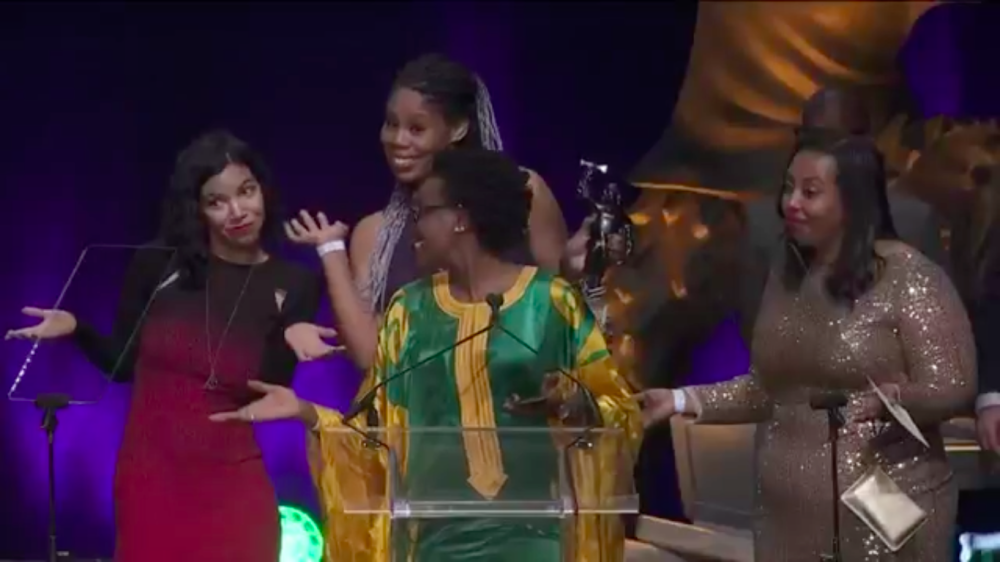OPINION
By Caille Millner
San Francisco Chronicle
WWR Article Summary (Tl;dr) When “Slack” (a team-based collaboration tool that’s the planet’s fastest-growing startup by many metrics) won the Fastest Rising Startup award at a recent Silicon Valley award ceremony it sent a team of black female engineers to the podium to accept it. It was a powerful statement to many who are focused on empowering women in silicon valley.
Silicon Valley
The technology industry’s diversity problems are so well documented at this point that its most powerful figures think it’s a joke.
I’m thinking of Kleiner Perkins Caufield & Byers senior partner John Doerr, who tried to joke at a September conference about two new partners who were “so diverse that I have a challenge pronouncing their names.”
Months on, still no one is laughing.
But at least there were a few glimmers of hope coming out of Silicon Valley this week.
The first sign came at the Crunchies, the annual award ceremony hosted by several technology blogs for the companies they cover.
The host, Chelsea Peretti, offered a few opening jokes about Silicon Valley’s homogeneity, and for the first time in nine years there was an award for diversity. Those gestures were nice, I guess, but self-satisfied awareness of your shortcomings only takes you so far.
That’s why the real news of the night was when Slack (a team-based collaboration tool that’s the planet’s fastest-growing startup by many metrics) won the Fastest Rising Startup award — and sent a team of black female engineers to the podium to accept it.
“The idea that diversity helps companies improve the culture and the bottom line may be somewhat controversial,” said one of those engineers, Kiné Camara. “But all we know is we’ve got 9 percent of women of color in engineering at Slack … and we are the fastest-growing enterprise software of all time.”
Camara is right, of course — last year McKinsey released a large, international report showing that companies in the top quintile for gender diversity outperformed their industry medians by 15 percent and ones in the top quintile for racial and ethnic diversity outperformed by a whopping 35 percent.
So what’s really controversial is why there’s still so much institutional resistance to executing this idea. Diversity is not rocket science — you just have to hire and support people.
And yet.
We’ve all seen the paltry annual diversity numbers from the largest technology companies; it’s frightening that they’re probably better than the industry average. It’s even worse at the highest levels of the industry, which is why the other big news of this week was Monique Woodard’s appointment at the venture firm 500 Startups.
Woodard will be the firm’s first African American partner. If that sounds a bit antiquated in 2016, consider the fact that venture capital may be one of the least diverse industries in all of Silicon Valley. One of the last major surveys in 2011 showed that 89 percent of venture capitalists were male and 86 percent of them were white.
Then consider the fact that these demographics have real effects on whose companies get funded: a new report from ProjectDiane showed that, of the thousands of venture deals completed from 2012 to 2014, just 0.2 percent of them went to black female founders. Black women are the largest-growing group of entrepreneurs in the U.S., with businesses generating more than $44 billion a year in revenue — and Silicon Valley’s venture capitalists treat them like a rounding error.
“I think there’s a huge opportunity to find startups that are connecting with black and Latino communities,” Woodard said. “Other founders are not really looking at these areas, and they don’t have the network or the founders in their portfolio to make investments in those areas. So I’m very excited.”
Woodard, who is in her 30s and lives in San Francisco, grew up in Ocala, Fla. “I grew up on a farm for most of my life,” she told me. But she’s been building things “for as long as I can remember,” and she found her passion when she took her first computer class at the age of 8. She built apps (my favorite of hers, Speak Chic, helps you correctly pronounce fashion brands), worked in management product development, and co-founded Black Founders, an organization to increase the number of black technology entrepreneurs.
“My job is the same as any investor, and that’s to make good investment decisions,” she said. “That said, I do realize that there’s a lot of attention on my role, and I want people who are interested in venture but haven’t had the example to see people who look like them.”
500 Startups is much more diverse than your average venture firm — founder Dave McClure told me that they’re about 50 percent women and have “lots of diversity within international geographies — Asia, Latin America and the Middle East” — but McClure said that it, along with the rest of the industry, could do “a lot” better when it comes to hiring diverse Americans.
“Between 10 to 15 percent of the U.S. is African American, and another 10 to 15 percent is Latino or Hispanic,” McClure said.
“That’s a third of the U.S. market that is drastically underrepresented. It’s because most VCs don’t grow up in those communities, don’t know those communities. So we’re taking advantage of an arbitrage issue that we can make money on.”
And make no mistake — both McClure and Woodard intend to make money.
“There are talented entrepreneurs that other people are overlooking,” McClure said. “We think we will make money by finding those people. It’s as simple as that.”
Sounds pretty simple to me.
Shame it’s taking their peers so long to get the message.














































































































































































































































































































































































